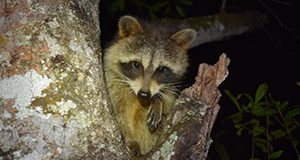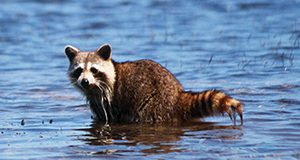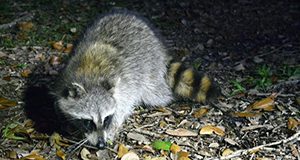Diseases carried by northern raccoons present significant health hazards to both people and pets. This 7-page fact sheet written by Caitlin Jarvis and Mathieu Basille and published by the UF/IFAS Department of Wildlife Ecology and Conservation is part of a series addressing health hazards associated with raccoons. It describes the raccoon roundworm and the disease it causes, baylisascariasis, which normally causes little or no trouble to raccoons but in severe cases can make people and their pets very sick. Sick wild animals can act tame, but do not approach! Contact animal control or a wildlife rehabilitator if an animal seems to be behaving abnormally or if you suspect it is sick.
https://edis.ifas.ufl.edu/uw480
Tag: Caitlin Jarvis
Facts about Wildlife Diseases: Raccoon-Borne Pathogens of Importance to Humans—Parasites

Diseases carried by northern raccoons present significant health hazards to both people and pets. This 7-page fact sheet written by Caitlin Jarvis and Mathieu Basille and published by the UF/IFAS Department of Wildlife Ecology and Conservation is part of a series addressing health hazards associated with raccoons. It describes the most important internal and external parasites associated with raccoons. Sick wild animals can act tame, but do not approach! Contact animal control or a wildlife rehabilitator if an animal seems to be behaving abnormally or if you suspect it is sick.
https://edis.ifas.ufl.edu/uw479
Facts about Wildlife Diseases: Raccoon-Borne Pathogens of Importance to Humans—Viruses and Bacteria
Diseases carried by northern raccoons present significant health hazards to both people and pets. This 7-page fact sheet written by Caitlin Jarvis, Samantha M. Wisely, and Mathieu Basille and published by the UF/IFAS Department of Wildlife Ecology and Conservation is part of a series addressing health hazards associated with raccoons. It describes rabies, canine distemper, feline distemper, canine parvovirus, salmonellosis, and several other raccoon-borne viral and bacterial diseases of concern to people and their pets. Sick wild animals can act tame, but do not approach! Contact animal control or a wildlife rehabilitator if an animal seems to be behaving abnormally or if you suspect it is sick.
https://edis.ifas.ufl.edu/uw478

